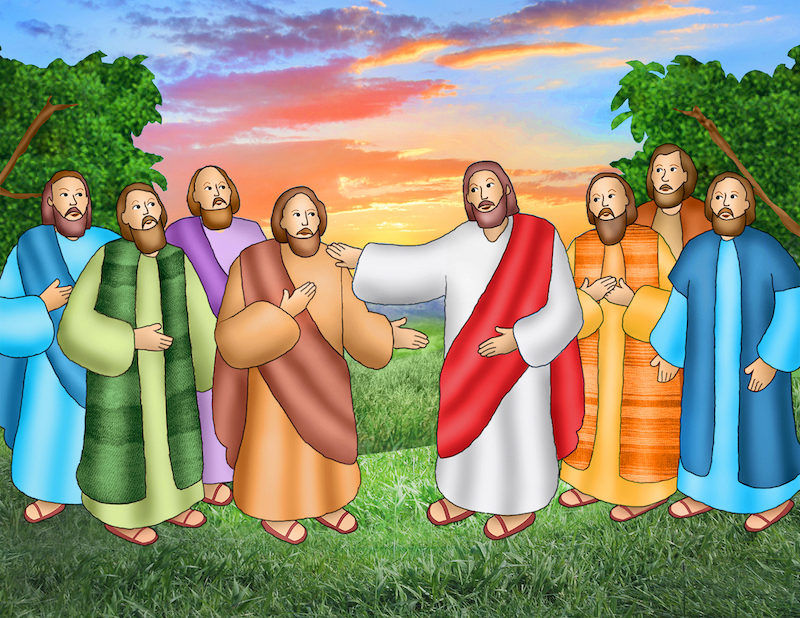CHILDREN’S STORY:
One day, the Pharisees and Sadducees wanted to test Jesus. They came to him and asked that he show them a sign from heaven.
“An evil and unfaithful generation seeks a sign, but no sign will be given it except the sign of Jonah,” Jesus replied, and he left them and went away.
Jesus and the apostles then went across the sea, where he gave his friends a warning: “Look out, and beware of the leaven of the Pharisees and Sadducees,” he cautioned.
At first, the apostles thought Jesus was talking about bread, because they had forgotten to bring some.
“Do you not yet understand, and do you not remember the five loaves for the 5,000, and how many wicker baskets you took up? Or the seven loaves for the 4,000, and how many baskets you took up?” Jesus asked. “How do you not comprehend that I was not speaking to you about bread?”
Jesus looked at his friends.
“Beware of the leaven of the Pharisees and Sadducees,” he repeated.
Then the apostles understood that Jesus was not talking about bread but was warning them to be wary of the teaching of the Pharisees and Sadducees.
Jesus and the apostles then traveled to the region of Caesarea Philippi, where he asked them a question.
“Who do people say that the Son of Man is?” he asked
“Some say John the Baptist, others Elijah, still others Jeremiah or one of the prophets,” they answered.
“But who do you say that I am?” Jesus wanted to know.
Simon Peter looked at Jesus.
“You are the Christ, the Son of the living God,” he answered.
“Blessed are you, Simon son of Jonah,” Jesus replied. “For flesh and blood has not revealed this to you, but my heavenly Father.”
“And so I say to you, you are Peter, and upon this rock I will build my church, and the gates of the netherworld shall not prevail against it,” Jesus continued. “I will give you the keys to the kingdom of heaven. Whatever you bind on earth shall be bound in heaven; and whatever you loose on earth shall be loosed in heaven.”
Then Jesus strictly ordered the apostles to tell no one that he was the Christ.
READ MORE ABOUT IT:
Matthew 16
Q&A
- What question did Jesus ask the apostles?
- Which apostle gave Jesus the correct answer?
TRIVIA: In Matthew 16, what did Jesus predict about himself? (Hint: verse 21)
Answer: He would be killed and raised.
BIBLE ACCENT:
What is “the sign of Jonah” of which Jesus spoke?
The New American Bible’s introduction to the Book of Jonah offers two interpretations.
The first has to do with Jonah running away when God called him to preach against the wicked city of Nineveh.
Jonah tried to flee by ship, but God caused a massive storm. The superstitious sailors believed Jonah was the cause of their troubles and threw him overboard. God then sent a great fish to swallow Jonah, who remained in the belly of the fish three days and nights.
“His experience of three days and nights in the fish is a ‘type’ of the experience of the Son of Man,” the NAB noted, referring to Jesus’ resurrection three days after his crucifixion and death.
The second interpretation, the NAB said, has to do with comparing how the Ninevites reacted to Jonah’s preaching vs. how people of Jesus’ generation reacted to his preaching.
When Jonah preached to the Ninevites, they immediately repented of their sins. However, the people of Jesus’ generation failed to obey his preaching, even though he is greater than Jonah, the NAB pointed out.
SAINT FOR TODAY:
St. Guy of Anderlicht
In the late 10th century, St. Guy of Anderlicht was born into a poor, rural family near Brussels, Belgium.
Despite being poor and at one time homeless, he had great faith and shared what little he had with others in need.
His devout life impressed a parish priest who made St. Guy a church sacristan.
St. Guy hoped to raise money for the poor by investing in a business scheme that ultimately failed. To repent for his unwise decision, he made a seven-year pilgrimage to Rome and Jerusalem on foot.
Exhausted and sick from the journey, St. Guy returned to Anderlicht, Belgium, where he died in 1012. We remember him on Sept. 12.
PUZZLE:
Using the hints provided, fill in the blanks in the sentences about bread.
- Give us today our _______ bread. (Matthew 6:11)
- I am the bread of _____. (John 6:35)
- If you are the Son of God, command this ______ to become bread. (Luke 4:3)
- He went into the house of God and ate the bread of ______. (Matthew 12:4)
Answers: 1. daily; 2. life; 3. stone; 4. offering

